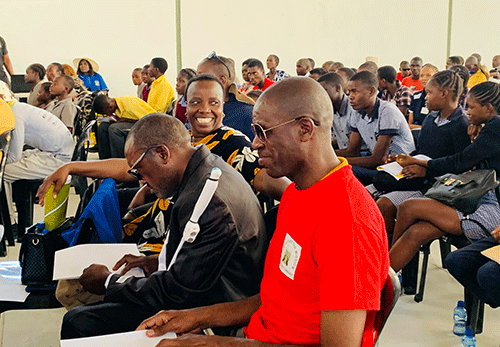Hilma Nakanduungile
Kristian Ndahepele
EENHANA – Deputy Prime Minister and Minister of International Relations and Cooperation Netumbo Nandi-Ndaitwah has called on Namibians to work together in addressing all social, physical and economic barriers that may impede the total inclusion of visually impaired persons.
She made this call in a speech read on her behalf during the commemoration and celebration of International White Cane Day, held at Eenhana in the Ohangwena region last week.
The day has been observed globally on 15 October annually since 1964 to celebrate the achievements of people who are visually-impaired, and highlights the importance of the white cane. Nandi-Ndaitwah said the white cane has proven itself over the years as a reliable guide which allows independence of movement and subsequently, independence of function. Hence, it is the first step towards social inclusion for the visually impaired. “The provision of white canes with the requisite training is the first step towards a meaningful future. This, coupled with adequate resources, can give real equality of opportunity, and will enable our blind and partially-sighted citizens to lead lives of dignity and progress,” she noted.
Nandi-Ndaitwah highlighted that although a large percentage of the visually-impaired in Namibia require the basic necessity of a white cane, the weak financial situation of many causes them not to afford it.
She then assured persons with disabilities that government remains committed to improving their living standards, and called on various stakeholders to work in collaboration with the Federation of the Visually Impaired in Namibia to learn and get to know their needs and assist them.
In a speech read on his behalf, Ohangwena governor Walde Ndevashiya said it is important that people with disabilities are given a chance to make the most of their lives and make their voices heard, as everyone else in the country.
“Ohangwena is one of the regions with a high number of people with disabilities. The region accommodates about 19 242 people with disabilities, including the visually impaired, which is equivalent to 7% of the region’s population,” he stated.
Ndevashiya said despite the recognition of persons with disabilities in the region, there are still challenges which require collaborative efforts. These include stigma and discrimination, lack of identity documents, gender based violence, and misuse of disability grants.
Director of the Namibia Federation for the Visually Impaired, Moses Nghipandulwa, said society needs to know the importance of the white cane, which will enable it to render help to the visually impaired. “When it comes to visual impairment, schools have a lack of materials and equipment for pupils to use. Also, we observed that only a few teachers have an interest in going the extra mile when teaching the visually-impaired. Another challenge is employment opportunities. Only a few visually impaired persons are employed both in the public and private sectors, and only very few of them hold senior positions,” he stated. Nghipandulwa, therefore, called for equal opportunities for persons with disabilities, and pleaded with good Samaritans to support the federation with white canes.
The day was celebrated under the theme ‘White cane, for safety and independence’.
– MICT Ohangwena


